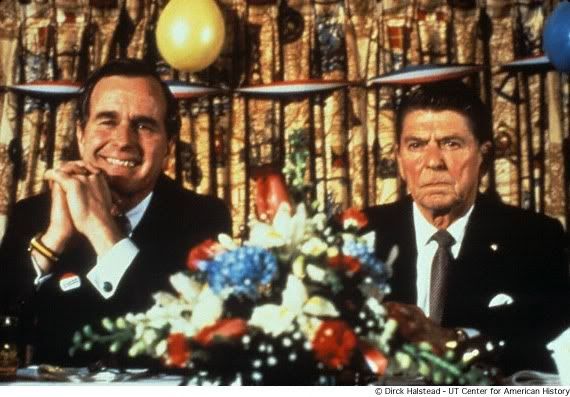General Discussion
In reply to the discussion: How Ronald Reagan's minions referred to Dr. Martin Luther King, Jr. [View all]Octafish
(55,745 posts)Maybe it's easier to control the puppet if he doesn't know he is one or what day it is.

Through a Glass Darkly
Alexander Cockburn
Lies Of Our Times (p. 12-13)
November 1991
What was surprising to me was Reagan’s condition. He was exhausted to the point of incoherence throughout much ofthe interview and could not remember the substance of any subject that had been discussed apart from Mitterrand’s expression of anticommunism. I had not seen Reagan at such close rangesince the assassination attempt nearly four months earlier, and was shocked at his condition.... Reagan simply was unable to recall the contents of the talks in which he had just participated.... The interview concluded at a signal from Deaver,who did not seem to find the president’s condition unusual.”
Thus ran Lou Cannon’s recollections of an interview with the Commander-in-Chief in 1981, as set forth in his book President Reagan: The Role of a Lifetime (New York: Simon & Schuster,1991), published earlier this year. But how did Cannon describe Reagan’s condition to the readers of the Washington Post when he wrote up his interview? In the July 23, 1981, Washington Post,Cannon’s story appeared under the headline “Reagan Describes Summit Meeting as ‘Worth Its Weight in Gold.’ ” Cannon’s report gives the impression of a lucid chief executive returning home after a fruitful colloquy with other western leaders at the economic summit held in Ottawa in mid-July. Cannon did mention in the tenth paragraph that “Reagan appeared tired to the point of near-exhaustion,” but this observation was quickly qualified by the opinion of “aides” that the president had been doing a lot of prep for the conference and was also worried about the Middle East.
Cannon shared his brief session with Reagan aboard Air Force One with Hedrick Smith of the New York Times, who similarly gave his readers the impression of a president in touch with things rather than the incoherent old man they had actually encountered. As did Cannon, Smith wove the few quotable remarks from Reagan into a tapestry of attributed presidential dicta passed on — and no doubt confected— by Meese, Deaver,and Speakes. It is clear from Cannon’s account of the conference itself that Reagan was fogged up throughout the actual conference, occasionally interjecting trivial observations or homely jokes into the proceedings and then relapsing into bemused silence. Cannon’s memoir is one more indication of the cover-up that took place in the wake of Hinckley’s assassination bid on March 30, 1981. At the time of the shooting, the press was full of phrases like “bouncing back,” “iron constitution,” and other terms indicating that Reagan had emerged from the ordeal in good shape. In fact Reagan very nearly died on the operating table and was a dotard afterwards. He never fully recovered.
Conclusion: Unless a president is actually dead, the WhiteHouse press corps can be relied upon to present him as both sentient and sapient, no matter how decrepit his physical and mental condition.
SOURCE in PDF form:
http://liesofourtimes.org/public_html/1991/Nov1991%20V2%20N10/Nov1991%20V2%20N10.pdf
PS: Dunno why my mentioning the BFEE gets some people so riled up.